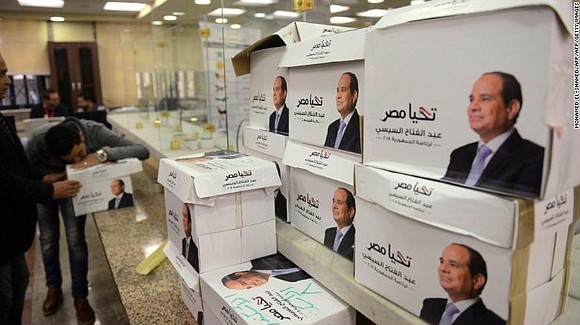Egypt elections: Polls open as Sisi faces little contest
CNN/Stylemagazine.com Newswire | 3/26/2018, 7:32 a.m.
By Sheena McKenzie and Mohammed Tawfeeq
(CNN) -- Polls have opened in Egypt's presidential election on Monday, starting three days of voting across the country.
Incumbent President Abdel Fattah el-Sisi is expected to win, with only one other candidate, Mousa Mostafa Mousa, remaining in the race. Multiple other candidates had tried to enter the contest, but have since quit.
The opposition blames Sisi's government for squeezing potential rivals through what they see as a strategy of intimidation or coercion, but the President says he is not to blame.
Detractors have accused Mousa of being a stooge candidate, sanctioned by the regime to give the election a veneer of legitimacy.
Mousa says he was a Sisi supporter before running, but claims his campaign is genuine.
'Get out and vote'
President Sisi cast his vote at a polling station in Cairo early Monday, one of 13,000 polling stations across the country.
One Sisi supporter, doctor Amr Kabil, told CNN: "I have hope about the future. We need to let the president finish his economic reforms."
At another polling station in central Cairo, nationalistic songs were blasting well before polls opened at 9:00 am local time.
Around a dozen young people wearing white T-shirts that read "Egypt First. Get Out and Vote" danced in the street while voters lined up inside the school to cast their ballots.
Third elections since Mubarak ousted
It is the country's third presidential election since former leader Hosni Mubarak was ousted in the Arab Spring protests of 2011.
It was hoped the protests -- and subsequent toppling of a dictator who had ruled for nearly 30 years -- would herald a new era of democracy in the Middle East's most populous country.
Instead, the country was thrown into further political turmoil.
In June 2012, political prisoner and former member of the Muslim Brotherhood, Mohamed Morsy, became Egypt's first democratically elected President.
A year later, after violent crackdowns on protestors, Morsy was ousted in a military coup led by then-army chief.
The following year, in June 2014, Sisi was declared the winner of the country's presidential election, with more than 96% of the vote.
In April 2017, Sisi became the first Egyptian leader in seven years to visit the White House, meeting with US President Donald Trump in the Oval Office.
Cost of living increases, liberties curtailed
Under nearly every indicator, life for Egyptians since 2011 has gotten worse. The cost of living has increased, inflation has reduced the value of salaries, liberties have been curtailed and the rise of terrorism has led to greater insecurity.
The country has been hit with several attacks, particularly on the Sinai Peninsula, where a bomb and gun attack on a mosque killed more than 300 people in November. It was around this time last year, on Palm Sunday, that twin bombings at Coptic Christian churches killed dozens of people in Alexandria and Tanta.
In its most recent annual report, rights group Amnesty International gave a scathing assessment of the country for its crackdown on dissent in recent years.
Despite the clampdown on civil liberties, Sisi has throngs of genuine supporters who argue that many of his stern measures have been necessary to bring order to Egypt after the chaos of the uprising.
With little doubt that Sisi will win the election, many observers will now be watching the turnout.
Robust participation might embolden the President to try and change the constitution restricting his term limits. The constitution stipulates a president can only be reelected once.
The winner is scheduled to be announced by the National Elections Authority (NEA) on Monday, April 2, according to state-run al-Ahram news.










